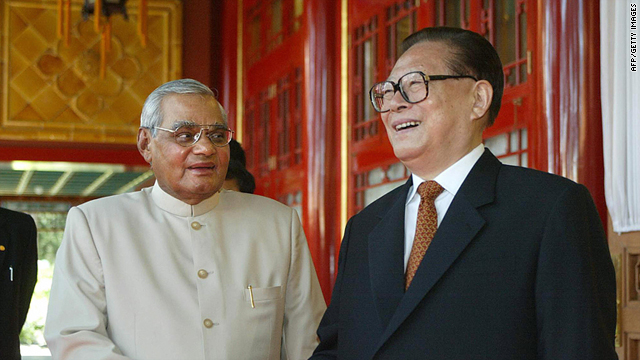Timeline: Key events in Sino-Indian relations

(CNN) -- Chinese Premier Wen Jiabao's state visit to New Delhi on Wednesday, aimed at strengthening bilateral ties, follows decades of turbulent relations between the two Asian giants:
March 17, 1959: Tibet's spiritual leader Tenzin Gyatso, the 14th Dalai Lama, flees his homeland on horseback, crossing the border into Indian territory to escape China's crackdown on the Tibetan uprising. New Delhi's decision to grant him asylum sours relations with Beijing.
October 20, 1962: China's People's Liberation Army attacks India. The PLA marches across the border from two fronts -- Ladakh in the west and across the McMahon Line on the east. Chinese forces capture Tawang, an important cultural center for Tibetans in the north eastern state of Arunachal Pradesh. One month later, China declares a ceasefire and announces its withdrawal from the disputed area, but territorial disputes along the 3,225-kilometer-long Himalayan border continue to strain relations. India says Beijing is occupying 33,000 square kilometers of its territory in Jammu and Kashmir while China claims the whole of Arunachal Pradesh, according to GlobalSecurity.org.
July 24, 1976: Diplomatic ties between India and China are re-established for the first time since the Sino-Indian war in 1962, according to The International Institute for Strategic Studies.
December 19, 1988: Prime Minister Rajiv Gandhi makes a five-day breakthrough visit to China, the first visit to China by an Indian prime minister in 34 years. The two countries agree to set up a joint working group to settle the boundary issue, according to China's Ministry of Foreign Affairs website.
November 28, 1996: Chinese President Jiang Zemin visits India, the first visit to India by a head of state from China. The two countries sign an Agreement on Confidence Building Measures in the Military Field in regard to the India-China border areas.
January 5, 2000: Tibetan Buddhist leader Karmapa Ugyen Trinley Dorje flees China and joins the Dalai Lama in India, according to the Karmapa's official website. Beijing warns New Delhi giving the Karmapa asylum would violate the Five Principles of Peaceful Coexistence.
June 23, 2003: Indian Prime Minister Atal Bihari Vajpayee makes a landmark visit to China -- the first Indian head of government to visit China in ten years -- to strengthen relations.
April 9, 2005: Chinese Premier Wen Jiabao visits Bangalore to push for an increase in Sino-Indian cooperation in high-tech industries. India and China also sign an agreement aimed at resolving disputes over their Himalayan border.
July 6, 2006: China and India re-open Nathu La Pass, an ancient trade route through the Himalayas which was once part of the Silk Road. This pass had been closed since the Sino-Indian war in 1962.
May 25, 2007: China denies a visa to a government official from Arunachal Pradesh, arguing that since the state is in fact a part of China he would not require a visa to visit his own country.
January 13, 2009: Indian Prime Minister Manmohan Singh visits China. Bilateral trade surpasses $50 billion and China becomes India's largest trading partner in goods.
October 13, 2009: India and China become embroiled in a dispute over Prime Minister Manmohan Singh's visit to Arunachal Pradesh. China expresses "strong dissatisfaction" on the visit to the "disputed area." India responds by saying Arunachal Pradesh is an "integral and inalienable" part of India.
August 27, 2010: India cancels defense exchanges with China after Beijing refuses to permit a top Indian army officer a visa because he "controlled" the disputed area of Jammu and Kashmir. India subsequently refuses to allow two Chinese defense officials to visit New Delhi, according to The Times of India.
